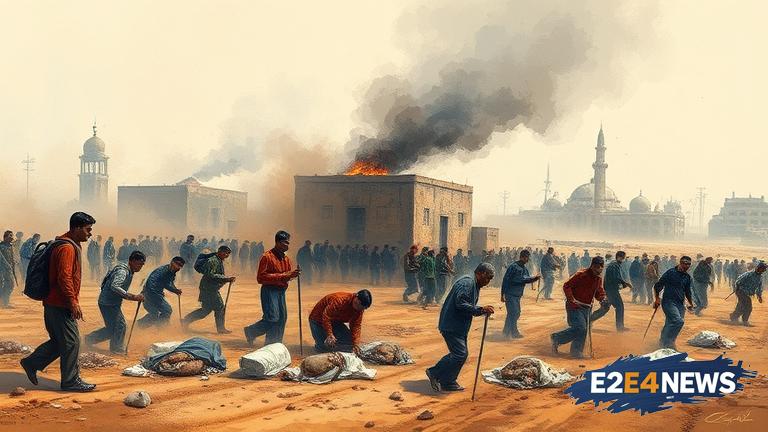The Gaza Strip is facing a severe humanitarian crisis, with dozens of Palestinians being killed while attempting to find food. The situation has become increasingly desperate, with many residents struggling to access basic necessities like food and water. The Israeli blockade of Gaza has been in place for over a decade, severely limiting the flow of goods and people into and out of the territory. As a result, the economy has been crippled, and poverty and unemployment rates have soared. Many Palestinians are forced to rely on aid from international organizations, but even this is often insufficient to meet their needs. The search for food has become a daily struggle, with many people risking their lives to find sustenance. The Israeli military has been accused of using excessive force against Palestinians, including those attempting to farm their own land or collect food from abandoned areas. The humanitarian crisis in Gaza has been exacerbated by the COVID-19 pandemic, which has further strained the already fragile healthcare system. The international community has been criticized for its response to the crisis, with many arguing that more needs to be done to address the root causes of the problem. The United Nations has warned of a potential catastrophe in Gaza, with the possibility of a complete collapse of the healthcare system and widespread famine. The situation is particularly dire for children, who are vulnerable to malnutrition and other health problems. The psychological toll of the crisis should not be underestimated, with many Palestinians experiencing trauma and stress as a result of the ongoing conflict. The Gaza Strip is one of the most densely populated places on earth, with over 2 million people living in a territory that is just 41 kilometers long and 12 kilometers wide. The blockade has had a devastating impact on the environment, with pollution and waste management becoming major concerns. The crisis in Gaza is not just a humanitarian issue, but also a political one, with the Israeli-Palestinian conflict at its root. A lasting solution to the crisis will require a comprehensive and sustainable peace agreement, one that addresses the needs and rights of all parties involved. The international community must play a more active role in promoting a peaceful resolution to the conflict, including through economic and diplomatic pressure. In the meantime, it is essential that humanitarian aid continues to flow into Gaza, and that those responsible for human rights abuses are held accountable. The people of Gaza deserve to live in dignity and security, with access to the basic necessities of life. The world cannot afford to stand by and watch as this crisis deepens, and it is imperative that action is taken to address the root causes of the problem. The situation in Gaza is a stark reminder of the need for a more just and equitable world, one in which the rights and dignity of all people are respected. As the crisis continues to unfold, it is essential that the international community remains vigilant and committed to finding a lasting solution. The people of Gaza will not be forgotten, and their struggle for justice and dignity will continue to be heard around the world.
